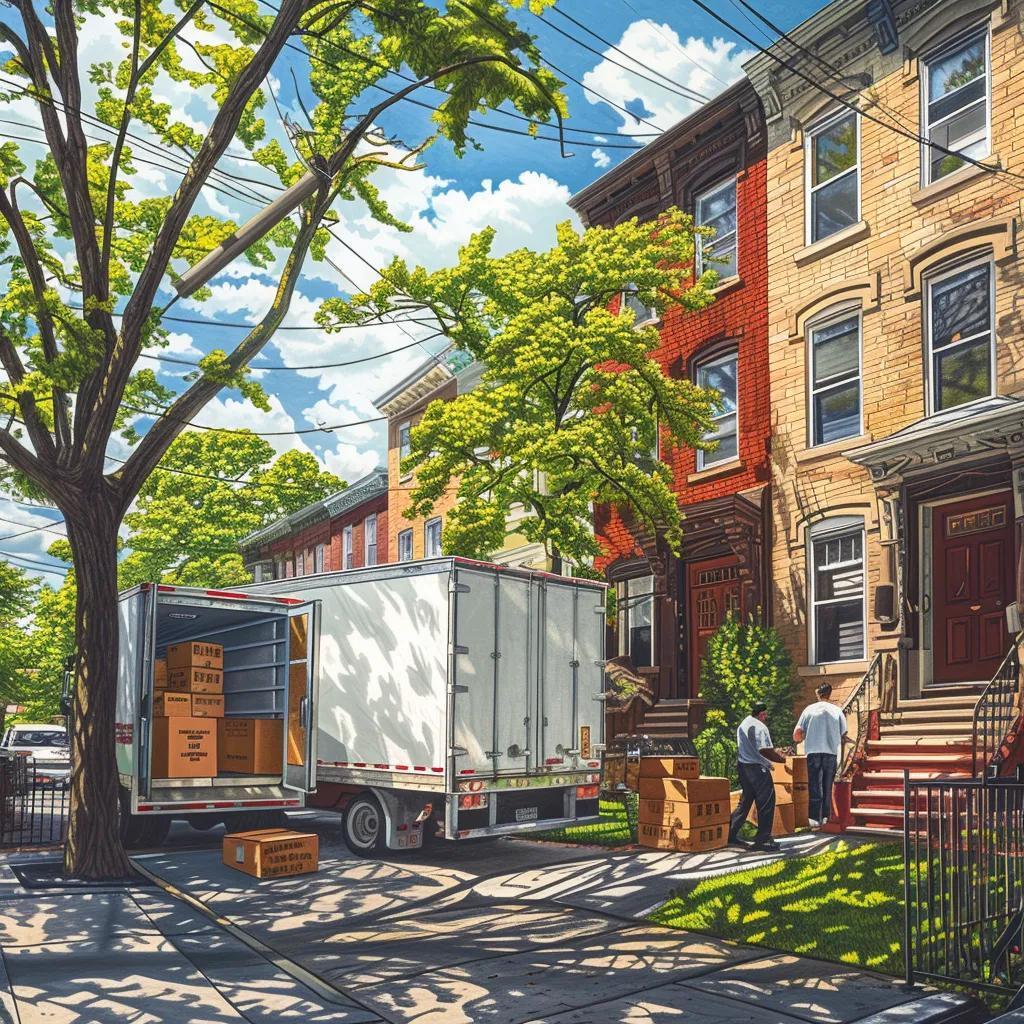How Much Do Local Movers Cost on Average in Philadelphia?

Local moves in Philadelphia typically range from $420 to $2,800 depending on home size, crew size and move complexity, giving you a clear budgeting framework. This guide breaks down average costs by property type, hourly rates, job difficulty, influencing factors, add-on services, tipping etiquette, neighborhood variances, estimate strategies and a DIY vs. professional comparison. You’ll discover how studio apartments differ from 4-bedroom homes, why summer rates spike, what packing services run, tipping best practices and how to secure transparent quotes for a stress-free relocation.
What Is the Average Cost of Local Moving Services in Philadelphia?

The average local moving cost in Philadelphia reflects a combination of labor, travel, home size and complexity, helping you estimate your total expense accurately. Across Greater Philly, most homeowners pay between $420 and $2,800 for a move within city limits, ensuring realistic expectations when planning your relocation budget.
Average Moving Costs in Philadelphia
Local moving costs in Philadelphia can vary significantly based on factors like home size and the number of movers needed, with costs ranging from $420 to $2,800. These costs reflect labor, travel, and the complexity of the move, which helps in creating a realistic budget for relocation within the city limits.
Moving.com, “How Much Do Movers Cost?” (2024)
This source provides a general overview of moving costs, which supports the article’s discussion of average moving expenses in Philadelphia.
How Do Moving Costs Vary by Home Size in Philadelphia?
Moving costs in Philadelphia increase with square footage and inventory volume, ensuring costs align with the time and resources required. Larger homes require more movers, additional packing materials and longer loading/unloading times, so each step adds to the final price. Below is an EAV table illustrating this relationship:
| Entity (Home Size) | Attribute (Average Cost) | Value (USD) |
|---|---|---|
| Studio Apartment | Moving Cost | $420–$600 |
| 1-Bedroom Apartment | Moving Cost | $550–$800 |
| 2-Bedroom Apartment | Moving Cost | $750–$1,000 |
| 3-Bedroom Home | Moving Cost | $1,100–$1,500 |
| 4-Bedroom Home | Moving Cost | $1,600–$2,200 |
These ranges factor in two movers and one truck, laying the groundwork for understanding how crew size and complexity further influence pricing.
What Are Typical Price Ranges for Studio to 4-Bedroom Moves?
Typical price ranges for studio through 4-bedroom moves depend on inventory volume, distance within city limits and required crew size, guiding you toward an accurate quote. For a studio, minimal furniture and boxes make the lower end feasible, whereas a 4-bedroom home with bulky items pushes costs higher due to increased manpower and time.
How Does Job Difficulty Affect Local Moving Costs?
Job difficulty in Philadelphia—such as narrow staircases, long carries or tight parking—adds extra labor time and specialized equipment, ensuring movers can navigate challenges safely. When stair carries exceed two flights or elevators are unavailable, companies often apply surcharges to compensate for added effort and risk, giving you transparency in how obstacles translate to fees.
What Are the Hourly Rates for Philadelphia Movers?
Hourly rates for Philadelphia movers reflect labor costs, insurance and equipment overhead, providing a straightforward pricing structure for local relocations. Most local moving companies charge per mover, per hour, so understanding crew composition helps you predict total labor expenses accurately.
What Is the Average Hourly Rate Per Mover in Philadelphia?
The average hourly rate per mover in Philadelphia typically falls between $80 and $90, offering a baseline for small to mid-size jobs. Rates include basic liability coverage and standard equipment, helping you compare quotes on an apples-to-apples basis when soliciting estimates.
How Do Rates Change Based on Number of Movers and Truck Size?
Increasing the number of movers or upgrading to a larger truck raises hourly rates to cover additional labor and fuel consumption, ensuring adequate resources for bigger moves. Below is a comparative EAV table for common crew configurations:
| Entity (Crew Configuration) | Attribute (Rate per Hour) | Value (USD) |
|---|---|---|
| 1 Mover, Small Van | Hourly Rate | $80–$90 |
| 2 Movers, 16′ Truck | Hourly Rate | $139–$199 |
| 3 Movers, 20′ Truck | Hourly Rate | $180–$240 |
| 4 Movers, 26′ Truck | Hourly Rate | $220–$300 |
These figures illustrate how additional personnel and vehicle capacity adjust labor pricing.
Are There Minimum Hourly Charges or Flat Fees?
Most Philadelphia movers impose a two- to three-hour minimum charge to cover dispatch and basic overhead, helping maintain efficiency for short moves. Flat-fee options sometimes apply for simple one-bedroom or studio relocations, offering predictable budgeting for defined service scopes.
Which Factors Affect Local Moving Costs in Philadelphia?
Several core factors—distance, access conditions, timing and specialty items—collectively determine your final moving cost, equipping you to identify potential surcharges before booking. By anticipating these influencers, you can select options that match both your logistics and budget.
Factors Influencing Moving Costs
Several factors influence the final cost of a local move, including distance, access conditions, and the time of year. Peak season, typically between May and September, often sees higher rates due to increased demand, while factors like limited access can lead to additional fees.
Angi, “How Much Do Movers Cost?” (2024)
This citation supports the article’s discussion of factors that affect moving costs, such as distance, access issues, and seasonal variations.
How Does Distance and Travel Time Impact Moving Prices?
Longer travel distances or peak-hour commutes in Philadelphia incur additional travel time fees and fuel surcharges, safeguarding mover punctuality and resource allocation. When crossing county lines or navigating heavy Center City traffic, companies include mileage charges to cover extended drive times.
What Access Issues Can Increase Moving Costs?
Limited access, such as narrow hallways, absence of elevators or long carries from sidewalk to front door, demands extra labor and equipment like furniture dollies or stair climbers, leading to added fees. Each additional floor carry can add $50–$100 per trip, reflecting the manual effort required.
How Does the Time of Year Influence Moving Costs in Philadelphia?
Peak season between May and September typically sees rates 10–20% higher due to elevated demand, ensuring mover availability when families relocate before school starts. Off-peak winter moves can be 10–15% cheaper but may require weather-proofing considerations.
What Are the Costs for Moving Specialty Items in Philadelphia?
Moving specialty items like pianos, pool tables or valuable artwork involves protective padding, custom crating and specialized crews, resulting in item-specific fees ranging from $150 for small pianos to $500+ for grand pianos. These safeguards ensure fragile and heavy items arrive undamaged.
What Additional Moving Services Are Available and How Much Do They Cost?
Add-on services extend beyond basic labor to include packing, storage solutions and insurance, allowing you to customize support levels to fit your time constraints and peace-of-mind objectives. Each service carries its own cost structure based on materials, manpower and duration.
How Much Do Packing and Unpacking Services Cost in Philadelphia?
Professional packing services in Philadelphia average $25–$35 per hour per packer, providing efficient, uniform crating for clothes, dishes and electronics. Unpacking services cost similarly, allowing you to settle in quickly without lifting a finger.
What Are the Typical Costs for Moving Supplies and Storage Solutions?
Moving supplies—boxes, tape, bubble wrap—typically add $100–$300 to your bill depending on quantity, while short-term storage starts at $50 per month for small units and can exceed $200 for 10×20 ft spaces. These options give you flexibility when your new home isn’t ready.
How Does Moving Insurance Affect Overall Moving Costs?
Basic liability coverage is usually included, but full‐value protection costs 1%–3% of your total declared value, ensuring reimbursement for repair or replacement, which is essential for high-value or sentimental belongings.
How Much Should You Tip Local Movers in Philadelphia?

Tipping movers demonstrates appreciation for care and efficiency, influencing team morale and service quality. Standard tipping guidelines in Philadelphia range from 10% to 20% of your total move cost, fostering goodwill and encouraging careful handling.
What Are Recommended Tipping Guidelines for Philadelphia Movers?
Most customers tip $4–$6 per mover, per hour for exceptional service, ensuring fair compensation for physical labor and professionalism. For a full-day move with two movers, this equates to $64–$96 each.
How Does Service Quality Influence Tipping Amounts?
Superior service—timely arrival, careful item protection and courteous interaction—warrants higher tips, reflecting your recognition of their expertise and respect for your belongings. A move completed under adverse weather or complex conditions often merits an extra $20–$50 per mover.
How Can You Get Accurate Moving Estimates from Philadelphia Movers?
Accurate quotes require detailed inventory lists, precise addresses and clear service requirements, enabling movers to factor in home size, distance, access issues and add-on services without guesswork. Transparent estimates reduce surprise charges on moving day.
What Should You Look for When Choosing a Philadelphia Moving Company?
Select a licensed, insured mover with positive local reviews and clear pricing policies, confirming their USDOT number and state mover registration to ensure legal compliance and consumer protection.
How Do Moving Companies Provide Transparent Pricing and Estimates?
Reputable movers furnish written estimates broken into line items for labor, travel, access fees and add-ons, plus a clear terms document explaining potential surcharges, empowering you to compare apples-to-apples and avoid hidden costs.
Are There Tools or Calculators to Estimate Moving Costs in Philadelphia?
Online calculators allow you to input home size, distance and services to receive ballpark figures instantly, offering a starting point before scheduling on-site surveys for firm quotes.
How Do Philadelphia Neighborhoods Affect Local Moving Costs?
Neighborhood characteristics—parking availability, traffic congestion and building logistics—impact both travel time and job difficulty, causing cost variances between city districts. Understanding local nuances helps you refine budget expectations.
How Do Moving Costs Differ Between Center City, Manayunk, and Fishtown?
Center City moves often carry parking fees and meter surcharges plus traffic delays, adding $50–$150 in access charges, whereas Manayunk’s row houses introduce narrow stair fees and Fishtown’s limited curb space may require shuttle services for an extra $75.
What Local Factors Influence Moving Prices in Philadelphia Neighborhoods?
Factors such as street parking restrictions, permit requirements, elevator availability and urban density dictate additional labor time or equipment, directly translating to surcharges that reflect real-world logistics.
What Are the Benefits of Hiring Professional Movers vs. DIY Moving in Philadelphia?
Professional movers deliver efficiency, insurance protection and specialized equipment, reducing physical strain and risk of damage compared to self-moves, which often incur unforeseen expenses and time burdens.
What Hidden Costs Should You Consider in DIY Moves?
DIY relocations can generate hidden expenses like truck rental fees, fuel surcharges, equipment deposits, hotel stays for multi-day trips and potential injury costs, quickly eroding anticipated savings.
How Do Professional Movers Provide Value for Philadelphia Residents?
Licensed movers minimize downtime with experienced crews, professional packing materials and full-value coverage, ensuring your move completes on schedule with less stress, damage and unexpected outlays.
Moving confidently in Philadelphia begins with accurate budgeting and clear expectations. By understanding average costs, hourly rates, influencing factors and add-on services, you’ll secure the best value. Compare quotes, factor in neighborhood logistics, tip generously for quality service and consider professional help to protect your belongings and your peace of mind.
Frequently Asked Questions
What Should I Do to Prepare for My Move in Philadelphia?
Preparing for a move in Philadelphia involves several key steps. Start by creating a detailed inventory of your belongings, which will help you determine what to keep, sell, or donate. Next, gather packing supplies such as boxes, tape, and bubble wrap. It’s also wise to notify utility companies of your move and update your address with important institutions. Finally, consider scheduling your move during off-peak times to save on costs and ensure availability of movers.
How Can I Reduce My Moving Costs in Philadelphia?
To reduce moving costs in Philadelphia, consider decluttering your home before the move. Selling or donating items you no longer need can significantly lower the volume of belongings to be moved, which in turn reduces labor and transportation costs. Additionally, booking your move during off-peak seasons, such as winter, can lead to lower rates. Lastly, packing your own items can save on packing service fees, allowing you to allocate your budget more effectively.
What Are the Benefits of Using a Moving Company Over DIY Moving?
Hiring a moving company offers several advantages over DIY moving. Professional movers bring expertise, ensuring that your belongings are packed and transported safely, reducing the risk of damage. They also provide necessary equipment, such as dollies and protective padding, which can be costly to rent. Additionally, using a moving service saves you time and physical strain, allowing you to focus on settling into your new home rather than the logistics of the move.
What Should I Look for in a Moving Contract?
When reviewing a moving contract, ensure it includes detailed information about the services provided, pricing structure, and any potential additional fees. Look for transparency in terms of labor costs, travel fees, and insurance coverage. It’s also important to check the cancellation policy and any guarantees regarding delivery times. A reputable moving company will provide a clear, itemized estimate and be willing to answer any questions you may have about the terms.
How Can I Ensure My Belongings Are Protected During the Move?
To protect your belongings during a move, consider purchasing additional moving insurance, especially for high-value items. Ensure that the moving company you hire offers liability coverage and inquire about their policies on damage. Proper packing is also crucial; use high-quality materials and techniques to secure fragile items. Label boxes clearly and communicate any special handling instructions to the movers to minimize the risk of damage during transport.
What Are the Most Common Mistakes to Avoid When Moving?
Common mistakes to avoid when moving include failing to plan ahead, which can lead to last-minute chaos and increased costs. Not researching moving companies thoroughly can result in hiring untrustworthy services. Additionally, underestimating the time required for packing and moving can lead to unnecessary stress. Lastly, neglecting to measure doorways and furniture can cause complications during the move, so always double-check dimensions to ensure a smooth transition.
Conclusion
Understanding the average costs and factors influencing local moves in Philadelphia empowers you to budget effectively and make informed decisions. By considering elements like home size, job difficulty, and additional services, you can ensure a smooth relocation experience. Take the next step by comparing quotes from local movers to find the best fit for your needs. Start planning your stress-free move today!
